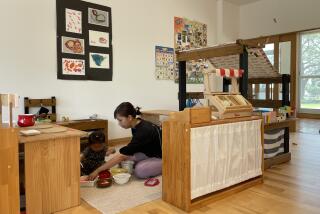Japan’s Royals Balance on a Tenuous Throne
- Share via
TOKYO — Emperor Akihito has never seemed more human, nor the palace over which he reigns more open.
As he recovered from a prostate cancer operation, doctors openly discussed details of his surgery, the disease and his prognosis, which they say is excellent. Just 15 years ago, the public wasn’t even told that Akihito’s father, Emperor Hirohito, had cancer until he died.
The public handling of Akihito’s illness offers a sharp contrast with the centuries of closely guarded secrecy that surrounded royal lives spent in quiet seclusion behind moats and palace walls.
Although the newfound openness has been welcomed by many, all is not well with the world’s oldest royal family.
Stripped of most of its official powers after World War II, Japan’s imperial household has struggled to define its modern, mostly symbolic role. It is becoming increasingly irrelevant to the young. And, with no male heirs to take over after the next generation, it faces its most serious succession crisis in centuries.
Attitudes toward Japan’s imperial household have undergone a marked transformation over the last 50 years.
Until the country’s defeat ended World War II in 1945, heavy propaganda by the government led Japanese to revere Akihito’s father as a living god. Today, young urbanites don’t seem to care.
“Talk about the imperial household with my friends? No, never,” said Satoshi Takahashi, 27, an office worker.
In a February poll by the newspaper Asahi, 56% of the people surveyed said they felt “in touch with the imperial household,” a rise of 12 percentage points from a similar poll in 1978. But only 21% of those in their early 20s said they felt that way, and 76% in the group felt that they were “out of touch.”
Public opinion polls also suggest that young people who do give any thought to the monarchy believe that it probably needs to move into closer step with the values of the rest of society.
A major test of the monarchy’s openness to change has emerged in its succession crisis.
No boy has been born to the imperial family since the 1960s, but a law written after World War II specifies that only men can assume the throne.
Polls have consistently shown strong support for a revision to allow an empress to reign, particularly after the birth of Crown Prince Naruhito’s only child, Princess Aiko, a little over a year ago.
Although many agree that there could be much to gain by allowing the Japanese monarchy to update itself, few seem to be willing to lead the effort -- least of the all the imperial family.
The imperial family has taken no explicit position on the issue, deferring instead to the government, which has shown little interest in making any changes.
“To debate the emperor system is still very much taboo,” said Hiroshi Takahashi, author of numerous books on the imperial household and a lecturer at Tokyo’s Kokugakuin University.
The problem, in large part, has to do with the historical legacy of the brutal war fought in Hirohito’s name that still looms over the Japanese throne.
After Japan’s defeat, Hirohito renounced his divine status and became a ceremonial “symbol” of the nation in compliance with U.S. occupation forces’ demands to separate state and religion.
The postwar palace has been stripped of its political powers, and giving the monarchy a more significant function is a suggestion that is routinely rejected by a public still wary of the wartime precedent.
The religious issue has been even more delicate.
The emperor quietly remains the head priest of Japan’s Shinto religion. In a “private” capacity, he performs the ancient rituals that trace his lineage to the sun goddess Amaterasu -- mythical progenitor of the imperial line and Japanese people.
Few politicians want to challenge this sensitive balance.
“Politically and economically, things have really stalled. It’s simply not the right climate to be debating imperial issues,” said Isao Tokoro, an expert on the imperial system at Kyoto Sangyo University .
Other experts stress that important changes are underway -- if slowly.
Kenneth Ruoff, director of Portland State University’s Center for Japanese Studies and author of “The People’s Emperor,” noted that Akihito’s wife, Empress Michiko, traveled alone to Switzerland in September to attend a children’s’ book festival. It was her first solo overseas trip in 43 years of marriage.
“It was hugely important step,” he said, arguing that it could set the groundwork for a future reigning empress by getting Japan accustomed to a more high-profile role for its imperial women.
More to Read
Sign up for Essential California
The most important California stories and recommendations in your inbox every morning.
You may occasionally receive promotional content from the Los Angeles Times.













